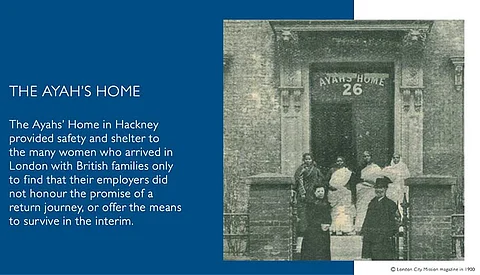

A home in London for Ayahs or nursemaids brought back by British families from India during the colonial era is to be honoured with a Blue Plaque as part of a series to highlight the working-class experiences of the city.
The Blue Plaque scheme, run by the English Heritage charity, honours the historic significance of particular buildings across London. The Ayahs’ Home in the Hackney area of east London, which dates back to 1900-1921, housed many maids from India and other colonies in South and South-East Asia.
MORE LIKE THIS…
English Heritage notes: “The Ayahs’ Home in Hackney provided safety and shelter to the many women who arrived in London with British families only to find that their employers did not honour the promise of a return journey, or offer the means to survive in the interim.
“The Ayahs, thus abandoned, were often forced into common lodging houses or the workhouse.”
The term “Ayah” was applied to all those women who served the British as nannies and nursemaids in India and other colonies. The home's Blue Plaque, part of the charity's 2022 cohort, forms part of an effort to celebrate women’s experiences in London by English Heritage, with the London home of British Indian spy Noor Inayat Khan among another recent one to be honoured.
MORE LIKE THIS…
Anna Eavis, Curatorial Director and Secretary of the English Heritage Blue Plaques Panel, said: “Many of the stories we are telling this year are those of London’s working class. I am particularly excited by the Match Girls’ plaque. This strike, organised by a group of impoverished young women, mostly between 15 and 20 years old, holds such an important place in the history of unionised labour and the women’s movement as a whole.”
The famous Match Girls’ Strike of 1888 is said to have changed the course of modern British labour history. It involved around 1,400 of the predominantly female workforce walking out of the match factory in the Bow area of east London.